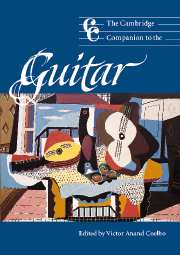Book contents
- Frontmatter
- Part I New guitar histories and world traditions
- Part II Jazz, roots, and rock
- 5 The guitar in jazz
- 6 A century of blues guitar
- 7 The turn to noise: rock guitar from the 1950s to the 1970s
- 8 Contesting virtuosity: rock guitar since 1976
- 9 The guitar in country music
- Part III Baroque and classical guitar today
- Glossary
- Notes
- Select bibliography
- General index
- Index of song and album titles
8 - Contesting virtuosity: rock guitar since 1976
from Part II - Jazz, roots, and rock
Published online by Cambridge University Press: 28 September 2011
- Frontmatter
- Part I New guitar histories and world traditions
- Part II Jazz, roots, and rock
- 5 The guitar in jazz
- 6 A century of blues guitar
- 7 The turn to noise: rock guitar from the 1950s to the 1970s
- 8 Contesting virtuosity: rock guitar since 1976
- 9 The guitar in country music
- Part III Baroque and classical guitar today
- Glossary
- Notes
- Select bibliography
- General index
- Index of song and album titles
Summary
Three chords
In late 1976, one of the first punk rock fanzines laid out a veritable philosophy of rock aesthetics in a graphic message. Three roughly drawn chord diagrams laid across the page, showing the readers how to finger the A, E, and G chords on the fretboard of a guitar. Accompanying the chords was a simple message: “This is a chord … This is another … This is a third … Now form a band.” The message was clear: rock music, and rock guitar playing in particular, did not have to be predicated upon the foregrounding of virtuosity. After all, despite the claims of such purveyors of “art rock” as Yes and Genesis, or such heroic guitar idols as Jimmy Page and Ritchie Blackmore, rock was not made to be “art” in any conventional sense of the term; not without cause did Chuck Berry tell Beethoven to roll over so many years earlier. Rock was meant to be basic, simple, unschooled, or else it risked losing touch with the elemental core of emotion that sparked the best rock and roll. Forming a punk band, then, should only require the most elementary skills. Three-chord song structures were at the heart of the rock and roll form, so three chords were all that any guitarist should need to put songs together and play in a band.
The renunciation of virtuosity among punk guitarists was not as all-encompassing as has often been portrayed. Depending on how broadly or narrowly one defines punk (or indeed, how one defines virtuosity), the moment of punk’s formation in the mid- to late 1970s included such formidable guitar talents as Robert Quine, of Richard Hell and the Voidoids, and Tom Verlaine and Richard Lloyd of Television. Nevertheless, declarations of the power of simplicity such as the above pronouncement were a powerful ideological tool in the efforts among punk bands, fans, and critics to break away from the dominant currents of 1970s rock music. Even if all punk guitarists did not shun the acquisition of musical technique, most questioned the uses to which that technique had been put in recent years, when musical ability had played into the hierarchical separation between rock audiences and musicians.
- Type
- Chapter
- Information
- The Cambridge Companion to the Guitar , pp. 122 - 132Publisher: Cambridge University PressPrint publication year: 2003
- 2
- Cited by



